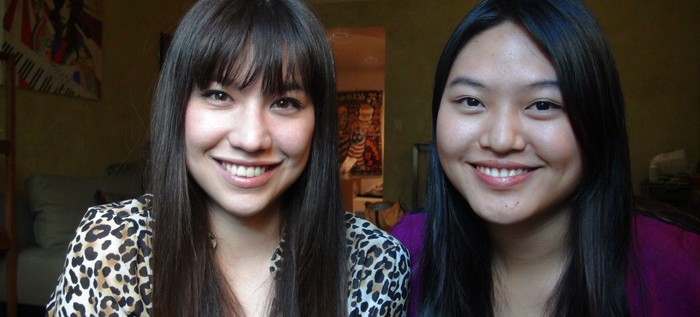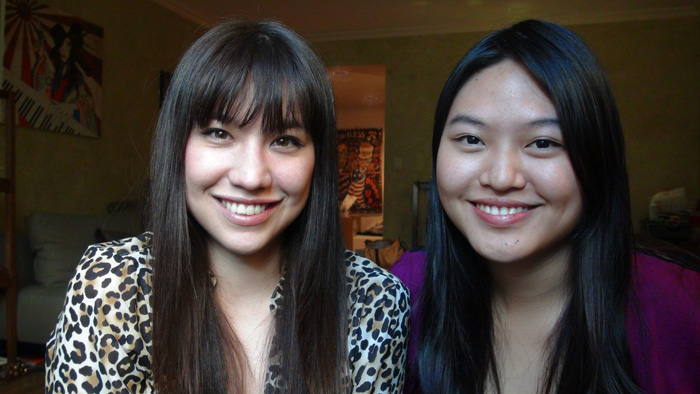Spookfish Theater: Advancing the Arts

When they realized that the theater industry had limited prospects for young people of color, Kat Yen and Ming Peiffer created their own opportunities. Now 25 years old, the emerging young artists founded Spookfish Theater in New York City in February 2010. By their third year as a company, they had written, directed, and produced over five full productions of their own that explore social issues of race, gender, sexuality, and class. With multi-ethnic casts and production teams, the duo also promotes race and gender equity by providing casting and hiring opportunities to the underrepresented and misrepresented.

Ming Peiffer (left) and Kat Yen (right) created Spookfish Theater 3 years ago and have independently written and directed 5 full productions together. Photo Courtesy Ming Peiffer
Yen and Peiffer met during their junior year of school at Colgate University where their first project together was Sarah Kane’s Blasted with Yen stage directing and Peiffer acting. After graduation, they were both interested in doing a project around Asian American issues and identity.
“I told [Kat] I’d been thinking about what it means to be Asian American and that I wanted to write about it…and she was super supportive,” said Peiffer.
After graduation, Yen worked as an assistant producer and stage manager for major festivals and theaters. They were small roles at huge companies and there wasn’t any opportunity to create unique work or direct.
“It wasn’t satisfying,” she said. “I didn’t have the opportunity to direct pieces about issues I cared about, that I was personally invested in, and so I felt stifled. I couldn’t get access to plays I loved that were well known, and I wasn’t able to meet up with people whose writing I loved and wanted to support.”
Finding each other and realizing their mutual aspiration created the opportunity to collaborate on Wabi Sabi! Not Wasabi (August 2010), one of two plays they developed around Asian American issues. Lacking resources, Peiffer found their first theater festival for Wabi Sabi! Not Wasabi just by searching for information on the internet.
“We got accepted and then the New York Times mentioned us and called us “Aware.” People started wanting to know our company name, so we chose one and continued doing original work together. Angryasianman.com did a feature on us too,” Peiffer said.
No Labels Please
Together, Yen and Peiffer don’t see their company as Asian American, they think of it as a company that deals with social issues. Where Spookfish stands apart is that their cast and crew is Asian American, but the stories in their plays are not.
One of their earlier plays, Relax, Alice (June 2012) explored the modern overuse of medication and the main character struggled depression and suicidal thoughts. Yen said, “We’re not trying to do just Asian American work. We’re interested in issues. …For us, it’s not so much about just writing Asian characters, but so, so much about creating opportunities for Asians.”
Asian Americans on the Production Side
While this is their first show to not have a predominantly Asian cast, this is also their first show with an entirely Asian American production crew.
Most of the criticism around the lack of diverse representation in the arts and entertainment industry has mostly focused on casting, but there is discrimination on the production side as well. When hiring a stage manager, Yen and Peiffer encountered a Filipino American who only does phone interviews, because his rate of being hired is higher when people don’t know his ethnic background.
With their work, Spookfish hopes to achieve wider recognition of Asian Americans in every theater company…without the theater company being labeled as ‘Asian.’
Yen pointed out, “How many white male playwrights and directors cast white male actors? Are they the white male theater company? It’s not just about being Asian American… but people ignore the majority of everything else we talk about. For example, we do a lot of plays around women’s issues as well, but no one calls us the ‘women’s issues’ company.”
Creating Equity in Casting
When casting, Yen and Peiffer purposefully see all actors that submit resumes regardless of the role. Because Asian American actors don’t get very many casting opportunities, there are major discrepancies between audition performances and the resumes which do not accurately reflect actual talent or experience.
“Most of the time if Asian characters are being written for, they’re there for XYZ reason. They’re never Asian for the sake of being Asian. If it’s written in, you have to explain it,” said Peiffer.
Yen said, “Often, Asian characters are used as a symbol rather than themselves as people and as human beings. Like someone will cast an Asian actress as a wife of a white male character to make it more ‘contemporary’ but that character is never substantial beyond their race.”
For their plays, Spookfish makes sure they create multi-dimensional characters that people can connect with on a variety of levels, instead of presenting clichéd and simplistic characters that lack depth.
As they started to working together on original plays, they heard stories from Asian American actors, which inspired The ABC’s Guide to Fame (November 2012), an examination of real lives of Asian American artists trying to succeed in the entertainment industry. Asian actors are the least represented demographic in Broadway, after actors with a disability.
“It opened up conversations for other stuff, like how there aren’t many Asian American contemporary directors,” said Yen. “We were already halfway through ABC and talking about it, and I realized that not a single director whose work I had recently seen and loved were Asian American. It seemed strange to me that I didn’t have an Asian American director to look up to.”
ABC was recently accepted into the 2013 New York International Fringe Festival, the largest multi-arts festival in North America that runs from August 9-25.
The Future of Spookfish
“We’re finally starting to see the pay off. We make the work the best we can every time, whether we have to lose sleep or throw in our own money. We take every opportunity we have and we do most of this out of our own pocket,” said Peiffer.
Recently, Yen was accepted into the 2013 Lincoln Center Theater’s Director Lab, an intensive summer study for emerging directors. Peiffer will be starting Columbia University’s Master of Fine Arts program in Playwriting. One of their goals is to start doing professional development workshops for young artists on how to start out in theater and survive in the theater while also staying true to oneself.
“We’re very happy we get to do the work that we want to do, the way that we want to do it and that people are receptive to it,” said Yen. “I’m lucky to have this partnership as I fully believe it’s almost impossible to do this on your own.”
Pornography for the People
For Spookfish Theater’s most recent play and their first Off-Broadway production, Pornography for the People, part one of a trilogy set in the Guangdong province of China, there are seven Asian American cast members across different ethnicities.
“The play was about the internet, and it was about censorship,” said Yen. “If set in China, it’s something that is far enough away that we can judge and critique it, but close enough that it’s also reflective.”
The play’s main character is a journalist who travels to China from Britain for a book. He interviews a woman named Mu Zi Mei, based on a real life person who started a controversial and popular sex blog of her own experiences. One day, Mu Zi Mei uploads a 25 minute podcast of herself having sex and ends up crashing the national server. Another character, Mr. Lin, is a successful magazine editor who felt stifled. He creates an alternate blog and personality pretending to be a 22-year old prostitute who wrote poetry. Getting overly confident, he released a blog entry where he named government officials in made-up sex acts.
When writing, Peiffer scoured the internet for details of what happens to the real Mr. Lin. He was discovered writing a blog entry at a coffee shop and detained, but that’s where the trail of information stops. Another character, Yi Yi, who will be the main subject of the trilogy’s second part, is a DIY-pornographer who ends in the relationship with the journalist.
“Asian women are overly sexualized and exoticized,” said Peiffer, the writer. “To have this character to use her body, sexual prowess, and ability to actually express herself is new. She’s acknowledging how others see her as a sexual object as she’s owning it.”
Advancing the Arts
Spookfish Theater’s newest satirical production Advance Guard, runs May 8-19 at New York City’s Kraine Theater (85 E. 4th Street). Inspired by the rebellious Post-Impressionist Avant-Garde artists group “Les Nabis,” the story follows two boys who drop out of art school and meet a subversive graffiti artist. Believing that nothing is new anymore, they start destroying famous works of art.
“It’s like Occupy Wall Street meets Fight Club meets the art world,” said Peiffer, who wrote the play. “The play is a critique on art in general, especially the way we’ve experienced our own career. Artists are putting their time and effort into things, but no one really cares. The only way to get on the headlines is to do something outrageous.”
Yen, who is directing, said, “This show feels more intimate, because the characters reflect people I know. The things being discussed are things we talk about every day and they’re very close to home, especially here in New York City. No one is taking artistic risks anymore. For example, every movie is a remake or sequel, and it’s a growing trend because of the lack of money.”
Because funds are being distributed towards work with more commercial appeal, there’s less original work by artists and also less interest in innovative work. Part of the Spookfish vision is to continue making unapologetic artwork that isn’t confined by marketability.
———————
In NYC? Visit www.horseTRADE.info or call Smarttix at 212-868-4444 to purchase tickets.
Interested in reading more about theater and the arts? Stay tuned for ALIST Magazine’s Spring Issue coming out soon for a special feature on David Henry Hwang.








